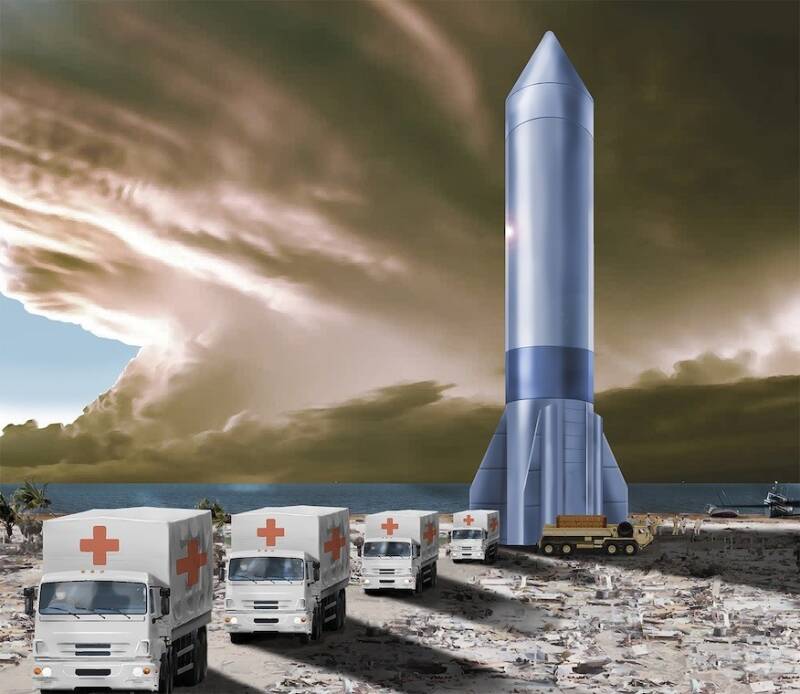Rocket Lab has announced plans to demonstrate the reusability of its upcoming Neutron rocket through a landmark return-to-Earth mission scheduled no earlier than 2026. The mission, backed by the U.S. Air Force Research Laboratory (AFRL), marks a key step in the Department of Defense’s (DoD) ambitions to use orbital-class rockets for rapid cargo delivery around the globe.

Rocket Cargo would enable rapid delivery of aircraft-size payloads for agile global logistics such as urgent humanitarian assistance and disaster response. Illustration: U.S. Air Force/Randy Palmer
Unveiled ahead of the company’s Q1 2025 earnings call, the mission falls under AFRL’s Rocket Experimentation for Global Agile Logistics (REGAL) initiative, also known as the Rocket Cargo program. This Vanguard initiative seeks to revolutionize military and humanitarian logistics through space-based transportation.
“AFRL will fly on a return-to-Earth Neutron no later than 2026,” Rocket Lab CEO Sir Peter Beck confirmed during the earnings call. “We know re-entry and rocket reusability is a critical advancement in space tech that the DoD is highly supportive of.”
While Beck described the mission as “multi-manifest,” he did not elaborate on the specific payloads. Rocket Lab stated the AFRL’s experiment will launch aboard the Neutron and re-enter Earth’s atmosphere, showcasing its reusability for future REGAL operations.
Currently, the Neutron rocket is progressing through qualification and assembly, with its inaugural flight slated for late 2025. Beck revealed that the rocket’s second stage has completed qualification and is entering final assembly, to be shipped soon to Launch Complex 3 at NASA’s Wallops Flight Facility in Virginia. The structure of stage two is similar to stage one, which Beck said helped mitigate development risk.
Rocket Lab’s growing ties to national security missions were further strengthened earlier this year when Neutron was approved to compete in the U.S. Space Force’s National Security Space Launch Phase 3 Lane 1 program, enabling it to vie for future launch contracts once flight-proven.
The REGAL program, launched in 2021 as the fourth Vanguard program by the Department of the Air Force, aims to prototype and experiment with new logistics methods. Previous Vanguard initiatives include autonomous drones (Skyborg), space-based navigation enhancements (NTS-3), and AI-driven weapon networks (Golden Horde).
“Rapid logistics underpins our ability to project power,” said Gen. Arnold W. Bunch, Jr., former commander of Air Force Materiel Command. “We see its initial applications in swiftly restoring operational capability in austere environments and dramatically reducing delivery times for humanitarian aid.”
In addition to Rocket Lab’s involvement, Sierra Space is also working with REGAL to scale up its Ghost decelerator spacecraft, increasing its capacity for delivering materiel to remote or disrupted locations.
To support future rocket cargo tests, the Air Force is evaluating Johnston Atoll as a re-entry site. A notice issued in March 2025 detailed plans to construct two landing pads capable of handling up to 10 landings per year during a four-year test phase. However, the Draft Environmental Assessment and Finding of No Significant Impact have yet to be publicly released.
Meanwhile, Rocket Lab’s workhorse Electron rocket continues its successful run, with five launches in Q1 2025 and over 20 planned for the year—up from 14 in 2024. However, the company has paused efforts to make Electron reusable, redirecting those resources to Neutron’s development.
“With Neutron at a sticker price of $55 million, it’s a much bigger impact to get that back versus a rocket with a price of $8.5 million,” Beck said.


Add comment
Comments